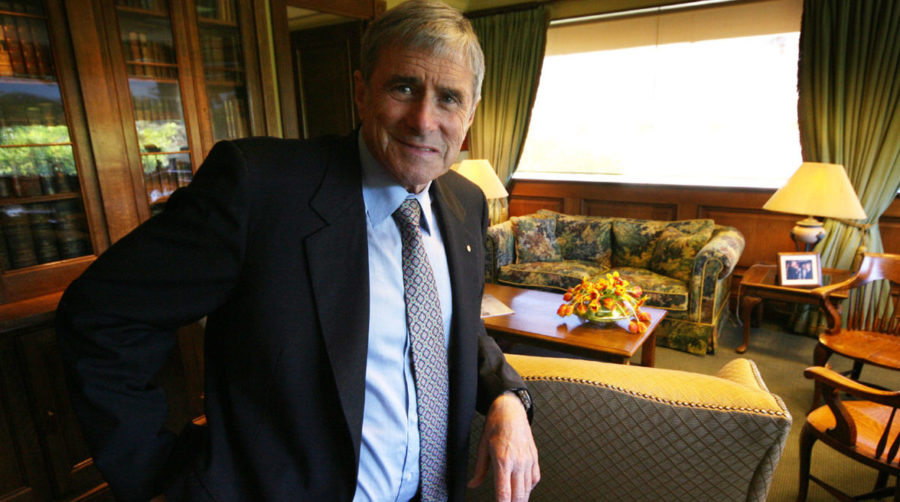• Seven West Media chairman reveals Tim Worner was prepared to quit over affair, but board asked him to stay
• There was certainly no shareholder rebellion: Four letters and one phone call
• Kerry Stokes and Tim Worner tackle journalists over board member and personal life jibe
MORE: Sector by sector Seven West Media performance breakdown
Seven West Media yesterday reported its results for the six months ending December 31, 2016. With the company continuing to deal with the continuing saga relating to the relationship between CEO Tim Worner and former employee Amber Harrison, the earnings call was one of the most anticipated financial events for some time.
Mediaweek learned that there was something like 200 people dialling in to hear from Worner for the first time since news of the affair became public late in 2016.
Joining Tim Worner on the call were Warwick Lynch – chief financial officer, Kurt Burnette – chief revenue officer, Clive Dickens – chief digital officer and Gereurd Roberts – CEO of Pacific. Seven West chairman Kerry Stokes joined later in the call.
At the top of the conference call, Worner said he had apologised for what happened. He added “We don’t wish to give any more oxygen to things that did not happen. The company has made a number of public statements on the matter and will continue to keep the market informed. Our team has been and continues to be totally focused on driving home our leadership. We have not been distracted.
“Our performance and the commitment of our people, in particular in the past two months, have been unwavering. In fact, our television business had its best summer in five years, growing its audience summer on summer and winning every key demographic.
“As a group, we are focused on evolving the company to meet the changing demands of our customers whether they be viewers, readers or advertisers and delivering an even stronger performance for our shareholders.”
On the key TV business, Lynch noted:
“Total revenue is up 5.4% to $699m, equivalent to a $36m increase in the face of a 4.5% decline in the traditional metro television ad market and a 2.7% decline in the newly defined total TV market which includes AVOD and live streaming.
“Seven’s metro and regional advertising revenues including broadcast and digital increased 4.6% against prior period.
“Seven’s share of the metro ad market was 40.8% in a half that benefited from the Rio Olympics.
“Program sales and third party commissions revenue grew by 16.7% or $7.2m. This is another great result for our production business with double digit growth continuing into a 6th year.
“Costs increased 16.4% or $78.4m. This increase is due to one-off Olympic rights and third party commission expenses.”
On the newspaper business Lynch reported:
“Circulation revenue was 4.6% lower, with digital edition sales up over 90% in the period, representing 11% of circulation volume.”
There was no bright spot for magazines:
“Circulation revenue declined by 13.8%. On a like-for-like basis excluding the closed and sold titles, the decline would have been 6.5%.
“Financial performance was impacted by the weakness in print advertising revenue, which declined by 22.5%.
“Magazines EBIT for the half was $1.3 million.”
—
In the much anticipated Q&A session at the end of the call, all the analysts largely had questions about the market and the outlook.
All journalists’ questions, however, related to the Worner affair.
Mediaweek had the opportunity to speak with chairman Kerry Stokes, asking him if Tim Worner had been prepared to step down as CEO at any time. Stokes revealed Worner would have done so if the board thought it proper. “This is a matter that goes back nearly three years,” said Stokes. “In my discussions when it first came to light, Mr Worner offered to do whatever was in the best interests of the company. The board resolved at the time that the best interests of the company were having Mr Worner staying.”
As to how the company had disciplined Worner, which was referenced in its February 3 statement, Stokes also told Mediaweek: “I am not given to polite language and I think you can take from that we had a very robust discussion.”
Stokes later in admitted in the call there had been no shareholder uprising over the matter, “We have 24,256 shareholders and I have had four letters and one phone call. Most shareholders see this for what it is and accept the board is taking appropriate action.”
When asked by someone else if Stokes had been involved in a media blackout on the story, he said: “I am not aware of any restraint on Seven News covering this issue. Our news editors will cover what they think is appropriate when they think it is appropriate.”
He added that Worner continued to have the full confidence of the board. “He is doing an outstanding job and he leads the best media team in Australia.”
Stokes added that the reason for Sheila McGregor’s resignation remains between “her and me, and I respect her enough to answer for herself”.
The caller later apologised for suggesting that the chairman may have tried to gag the director. “That is outrageous. Are you seriously suggesting I or my board would tell a director what they can or can’t do?” said Stokes. “How dare you.”
Another caller tried to ask about Worner’s personal life. Worner said: “It was very poor judgment what I did, something I continue to regret and attempt to repair, and it has hurt a lot of innocent people. I apologised at the time and again in December. I am very much owning my decision and [for the business] we need to get on with the transformation of Seven West Media.”
The caller then embarrassed himself by asking: “How is it going in your personal life, Tim?”
Worner: “That is a private matter, and I hoped you would respect that privacy.”
Just one further question was allowed before the call was ended.
